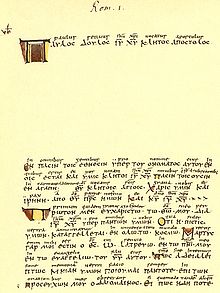
Back Lakune (manuskripte) Afrikaans بياض صفحة Arabic Llacuna (filologia) Catalan Lakune Danish Lacuna (Philologie) German Lakuno (filologio) Esperanto Laguna (filología) Spanish بیاض Persian Lacuna (naskah) ID Lacuna (filologia) Italian

A lacuna[Note 1] (pl. lacunae or lacunas) is a gap in a manuscript, inscription, text, painting, or musical work. A manuscript, text, or section suffering from gaps is said to be "lacunose" or "lacunulose".
Weathering, decay, and other damage to old manuscripts or inscriptions are often responsible for lacunae - words, sentences, or whole passages that are missing or illegible. Palimpsests are particularly vulnerable. To reconstruct the original text, the context must be considered. In papyrology and textual criticism, this may lead to competing reconstructions and interpretations. Published texts that contain lacunae often mark the section where text is missing with a bracketed ellipsis. For example, "This sentence contains 20 words, and [...] nouns," or, "Finally, the army arrived at [...] and made camp."
- ^ Harper, Douglas. "lacuna". Online Etymology Dictionary.
- ^ lacuna, lacus. Charlton T. Lewis and Charles Short. A Latin Dictionary on Perseus Project.
Cite error: There are <ref group=Note> tags on this page, but the references will not show without a {{reflist|group=Note}} template (see the help page).